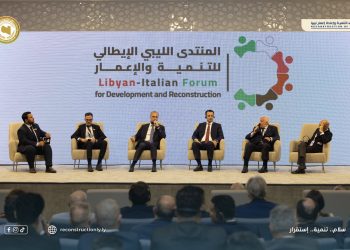British businessman Richard Galustian, who has lived in Libya since the revolution, asks just how bad Jadhran is for . . .[restrict]Libya’s international business prospects.
It is clear that things are not going as planned for militant federalist Ibrahim Jadhran. His blockade of oil production in the east of Libya has provoked a widening popular backlash. Even his own Marghaba tribe has distanced itself from his theatrics.
His recent attempt to curry favour with Washington has also backfired when it was revealed in public documents that his lobbyist was an Israeli. Jadhran’s subsequent attempt to distance himself from this with a public denial, despite the signed documents, has also done nothing to enhance his profile internationally.
He also denied that Cyrenaica was seeking international recognition saying that his focus was on a federal Libya. In a perhaps surprising move, Jadhran also said, however, that Libyans should stand united against the Muslim Brotherhood, saying that they were being funded by stolen money from the country’s oil wealth.
With such dwindling capital, the question now is, what – if anything – can Jadhran realistically achieve before the constitution is established?
If his federalist movement does succeed, it would undoubtedly strike a blow to the prospects of national unity and Libya’s democratic process. Such a move would also come as a disappointment to the international community, much of which supported the overthrow of the former regime in the interest of a unified, territorially intact Libya.
It is clear that easterners have an understandable grievance. Having felt as though it was long the poor relation under the former regime, it now feels that the Tripoli-based government has so far made little tangible progress in readdressing the balance.
It could be argued that federalism could see a more equal distribution of the wealth generated by the country’s hydrocarbon resources – something new for the eastern region. However, such achievements could be at the expense of relations with other regions of Libya and friendly international communities. It would also further undermine the cohesion and unity of a country already hampered by strong tribal and regional allegiances.
It would appear that Jadhran and his supporters want to give a sense locally that the main aim of federalism is to raise both the wealth and the profile of the east. On an international level, however, the subtext seems to be to find a way to present the current crisis and the federalist position as being in western interests by ‘showing’ (by employing international lobbyists such as the one Jadhran apparently chose then rejected) how it could be of benefit to them, the West (and to Russia, although its acquiescence would be highly unlikely).
This has already backfired, and not only in the lobbyist debacle. Despite apparent Jadhran’s intentions to keep oil tankers intending to load from oil ports controlled by his forces safe, this is clearly not within his power. When a Maltese-flagged tanker recently approached the export terminal of Es Sider, the Libyan Navy intercepted it with warning gunfire and elicited a promise from the crew over the radio that such an attempt would not be made again. Prime Minister Ali Zeidan then announced that greater force would be used against any tanker approaching ports not operated by the Libyan authorities. Jadhran appears unable to sell the oil resources he controls. He has since said that no oil would be exported until a committee had been formed by the three regions to oversee this. This begs the question, at whose invitation did that tanker enter Libyan waters?
To all appearances Jadhran’s strategy is, to say the least, naive and, with the latest developments, verging on the irrational. By obstinately continuing his brinksmanship, Jadhran appears to be showing Libya and the world that he is motivated more by self-serving financial greed than the good of Libya or even his fellow easterners.
What is needed now is a way out of this impasse before the economic aftershocks further threaten Libya’s development and before foreign investors are further scared away. That will depend upon Libyans and the international community supporting the country’s legitimate government, however flawed and fragile it may be.
Ali Zeidan stands at the centre of this effort and, in the midst of extraordinary pressure, he has demonstrated an unflagging resolve to end the standoff peacefully while at the same time addressing the grievances of easterners in a lawful manner. In this he deserves the unqualified support of Libyans—and the international community.
Opinion articles do not necessarily reflect the views of the Libya Herald [/restrict]



